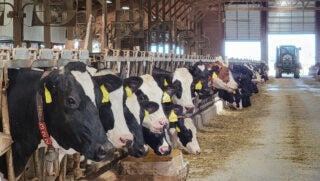The USA needs FFA. This week Agriculture Committee Chairmen Sen. Pat Roberts, R-Kan., and Rep. K. Michael Conaway, R-Texas, addressed more than 100 state FFA officers, urging them to advocate on behalf of agriculture and take advantage of the plentiful jobs within agriculture.
“Our country needs more people like you, who know where their food and fiber come from, the hard work it takes to get it from the farm to the store, and the value of the rural way of life,” Chairman Roberts said. “Your voice is important and deserves to be heard – not only in a few years after you finish college, but right now. This year, the United States Congress is considering legislation that impacts many of your daily lives and communities. Unfortunately, too many times the loudest voices are coming from those that do not understand production agriculture or even the rural way of life. That is why I am glad to see you here, learning about your capital, your legislature, and the importance of your voice.”
“FFA is at the heart of American agriculture’s future,” Chairman Conaway said. “For nearly 90 years, FFA has remained committed to providing youth with opportunities to achieve personal growth, premier leadership and career success through agricultural education. As we prepare to write the next farm bill, I appreciate hearing from FFA students about their interest and concerns in U.S. agricultural policy, applaud their dedication to the future of farming and ranching, and I remain confident the future of American agriculture rests in good hands.”
This week Secretary of Agriculture Sonny Perdue announced that his organization plans to partner with National FFA to support youth, and prepare the workforce of tomorrow for unique careers in agriculture. Perdue and Mark Poeschl, CEO of the National FFA Organization, signed a memorandum of understanding hoping to solidify that relationship.
Under the MOU, the USDA and FFA will collaborate on both short and long term initiatives to motivate and prepare young people, connect them with opportunities in agriculture, food, and natural resources systems, and build appreciation for the reach and importance of agriculture.


